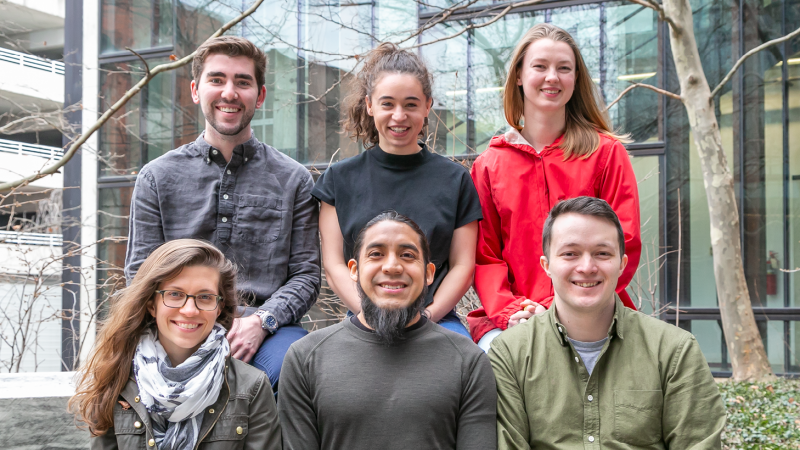Six Knowlton Students Awarded 2019 ARTA Grants
Six Knowlton Students Awarded 2019 ARTA Grants
Six Knowlton School students are this year’s recipients of Architecture Research and Travel Awards (ARTA), which supports independent research during summer 2019. This year’s awardees are:
- Sarah Coleman (MLA), Building the Beaten Track: Heritage Landscapes at Risk in the Caucasus
- Rosalie Starenko (MLA), Gothenburg, Sweden: Documenting a Dichotomy of Social and Environmental Sustainability
- David Jefferies (BSCRP), Puerto Rico: An analysis of the Nuevo Normal
- Ryan Vogel (MSCRP), Urban Planning Lessons from the Past
- Lilly Saniel-Banrey (BSARCH), The Playful City: Rotterdam, Netherlands as a Model for Child-centric Urban Innovation
- Brett Wedding (BSARCH), Switzerland, Germany, Austria, Czech Republic, and Denmark: Architecture from New Perspectives
Sarah Coleman | The Transcaucasian Trail Association (TCTA) purports to maximize self-determination and economic benefit for local communities while also encouraging the preservation of cultural and ecological landscapes. Through interviews with NGOs, ecologists and preservation professionals in Yerevan and Tblisi, as well as with local guides, park rangers and community organizers who work and live along the trail, Coleman’s research will gauge the relative success of TCTA’s goals. Criteria for judgement will be (1) Improving Access to Historic Sites, (2) Encouraging Preservation and (3) Benefitting Local Communities through Sustainable Tourism.
Rosalie Starenko | Starenko’s research will investigate the following questions: How do immigrant populations use green space in Gothenburg? What is the Swedish perception of new immigrant space, versus the reality? How does this influence design and how can it be applied to design in American landscapes as we build space to confront racism? Drawing conclusions from the Biskopsgården neighborhood in Gothenburg, Starenko’s will explore new possibilities of inclusive design in other landscapes and how these solutions can influence the design of future spaces to confront racism.
David Jefferies | Jefferies will investigate the preparedness and response to heavy damage caused by hurricanes Irma and Mari to Puerto Rico in 2017. Focusing on the communities of San Juan, Ponce, Juana Diaz and Toa Alta, Jefferies will use qualitative and quantitative data to map perceptions of the disaster, the response and current conditions relative to socioeconomic status and the allocation of post-hazard resources. With this research, Jefferies hopes to contribute to the larger dialogue of hazard mitigation, response and resilience in vulnerable communities, while documenting this Nuevo Normal.
Ryan Vogel | City and Regional Planning’s International Development Studio focused on researching and developing strategies for the Belize Association of Planners (BAP) on the following topics: Advocacy, Coastal Resilience, Safety, Education and Transportation. Vogel will conduct on-site research to examine what did and did not work well regarding the studio’s recommendations and share with Knowlton faculty his findings to improve future projects in the development studio. He will also participate in producing a comprehensive citywide park plan for the Belize City Council.
Lilly Saniel-Banrey | Rotterdam’s child-centric urban design offers a dynamic and repeatable model for a more sustainable and equitable approach to urban design. Conducting research primarily in the neighborhood of Oude Noorden, Saniel-Banrey will study the polycentric nature of child-friendly spaces within the city at large as it relates to new models of design, transportation and scales of safety/equity measures used to evaluate the effectiveness of the playful city model at a larger scale.
Brett Wedding | Wedding’s research will analyze a carefully selected group of constructed works in Central Europe. Architectural themes, styles and materiality will be recorded in a series of short films, photographs and three-dimensional scans through the use of drone technology, which is able to combine multiple elements of representations and output innovative new imagery. Materials produced by this project will be added to the Knowlton School’s digital archive and will help establish a school standard for drone documentation.
The ARTA program was established to encourage independent travel and research initiatives of up to 30 days by Knowlton students from all degree programs. The ARTA program is made possible by generous support from the Columbus Foundation. In the fall semester following completion of their projects, ARTA winners present their work at the school.


